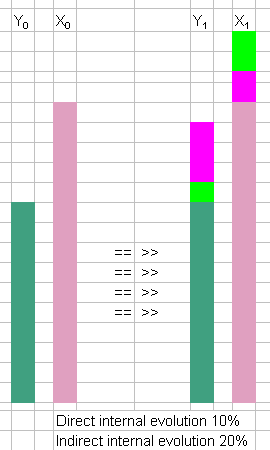9. An alternative theory of evolution
The EDI Study confirms the forecasts of the theory of Conditional Evolution of Life and the Global Cognitive Theory, which points to a new cognitive paradigm both because of the innate nature of the intelligence as per the functional aspects of its biological basis.

If these characteristics of cognitive processes are correct, educational programs should change accordingly.
Before listing the main conclusions of The EDI Study, the observed value of Fisher's statistical function F assured that the parameters were not a random result.
Except for error or omission, and with the appropriate caution, the main results of The EDI study as a base of an alternative theory of evolution are the following:
-
The innate nature of relational intelligence
The historical difficulty in perceiving this characteristic of the brain functions is due mainly to the next factors:
-
The multiple functions of the human intellect
-
The lack of a theoretical-philosophical basis providing the laws of the cognitive abilities seem to govern the formation of intellectual potential resulting from a genetic mixture. In other words, the identification of the gene or chromosome significant for specific cases of conditional intelligence
-
The fact that not all genetic load expresses
Lack of stability in the manifestation of intellectual power
Measurement deviations
In some instances, different IQ measurements from the same person could have the same deviations as those of monozygotic twins (identical) or those of dizygotic twins (twin brothers), which would be conceptually like semi-mono-environmental siblings as well.
Shortage of available data for the research due to its nature, economic cost and social sensitivity of the subject
Random and discrete type of the Mendelian genetic combination
Other random characteristics operate within continuous variables.
The existence of functional limitations or genetic problems in the expression of intellectual potential with an unknown origin and treated as random.
However, the research cites some of its possible causes
-
The necessity of capacity for statistical calculi and of intuitive understanding of the results of the Globus Model
-
It seems the method of Logical Verification of Information (LoVeInf) is operative in the expression of the intelligence power following previsions of the General Theory of Conditional Evolution of Life (CEL)
This method shows that chief genetic information about intelligence comes from both progenitors. The configuration of the concept of intelligence as a primary group of abstract relational abilities that are highly reliable in regards to their efficiency needs the LoVeInf method.
Similarly, the concepts of the dominant and recessive genes of the Mendel laws should change by the implications of the existence of this method.
Approximately 500 million correlation coefficients allowed the results of The EDI Study. From them, through the sensitivity analysis of the parameters involved, it seems that male genes provide both direct and indirect internal evolution, also indicated by the CEL.
The percentage of internal evolution of the intelligence potential that optimizes the Globus model is 5% for both internal evolutions, representing a 10%, again as foreseen by the CEL.
These percentages explain why the IQ test norms must update every 15 or 20 years.
The previous points rigorously support the logic of the existence of sexual differentiation and its significant advantages; however, we should not forget that they imply biological differences.
An aspect to remark is that the increase generated by men also comes from specific changes due to the improvement of available materials thanks to the amelioration in the quality of males' formation when in the womb.
Nonetheless, women's genes may fulfill a backup function to maximize the assurance of the viability of the new being.
If the previous conclusions were correct, there is a non-random and finalist evolution. Therefore, the natural selection would mean a second level supporting the evolutionary processes.
More extensive studies are necessary, considering the extraordinary results (r² superior to 0.9) to be more accurate in the conclusions regarding qualitative specifications of the model and quantification of the parameters involved. These studies could also incorporate other types of conditional intelligence.
An example of further exploration of this study is in the subsequently added section of the Globus Model with mate selection.
Another example is Darwinout experiment –not yet carried out– to confirm the results of The EDI Study with a different methodology and, if the X and Y sex chromosomes are not responsible for the evolution of intelligence, to determine the correct chromosome.
The EDI Study created artificial intelligence quotients vectors in a computer simulation model. The new IQs allow the analysis of the model, and its variability by stages, for example, fixing the Mendelian combination, the level of genetic affinity, and the functional limitations or genetic problems.
It is important to stress that not only is there a shortage of source data, but also that it can be costly to obtain the necessary and appropriate data.
The EDI Study has scrupulously respected the scientific method rules.
The Globus Model contains the same parameters that the free billiards game Esnuka (1991) handles. That is, the genetic algorithms of the computer simulation are the same.
From previous conclusions and their philosophical implications, it appears that the current Gods of science, Ra & Donna, straight reminiscences of the Egyptian Goddess Hator and the Mesopotamia God Ale, have not been able to continue hiding the logic or intelligence of the evolution of life, nor to prevent the latter from formally appearing to us, although somehow, still timidly.
